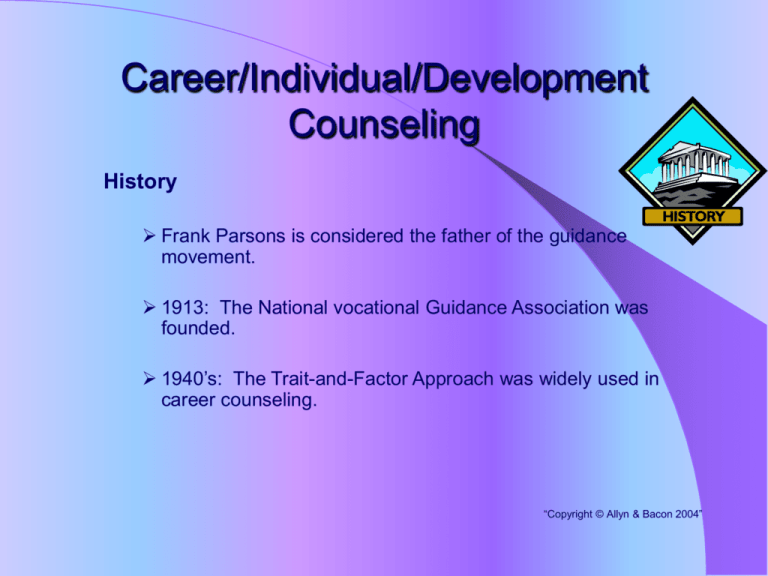Introduction To Counseling
advertisement

Career/Individual/Development Counseling History Frank Parsons is considered the father of the guidance movement. 1913: The National vocational Guidance Association was founded. 1940’s: The Trait-and-Factor Approach was widely used in career counseling. “Copyright © Allyn & Bacon 2004” Career/Individual/Development Counseling History 1950’s: Career guidance utilized more counseling using career development theory with a focus on communication and decision-making skills. 1970’s: The federal government subsidized a career educational program to facilitate career planning and increase career options. 1990’s: Career education also included a school-to-work transition program. “Copyright © Allyn & Bacon 2004” Career/Individual/Development Counseling Definition Career: Defined as a client working out a purposeful life pattern through work over time. Career development: Defined as the psychological, educational, sociological, physical, economic, and chance happenings that influence and shape a client's career. Career Counseling: The series of interventions throughout a client's lifespan that deals with: work selection, satisfaction, intrapersonal matters, lifestyle issues, and integrating life’s roles. “Copyright © Allyn & Bacon 2004” Career/Individual/Development Counseling Definition (continued) Lifestyle: A person’s aspiration for social status, a specific work environment or climate, education, mobility and financial security. Career Life Planning: An ongoing evaluation of life and career plans that allows for changes as needs and circumstances change. “Copyright © Allyn & Bacon 2004” Career/Individual/Development Counseling Theories of Career Counseling Trait-and-Factor (Frank Parsons & John Holland): Finding a suitable match between the work environment and the personality traits of the worker. Social Learning Theory (John Krumboltz): Learning experiences are followed by rewards and punishments and learning experiences influence a person’s career choices. Situational Approaches: A sociological approach that accounts for situational factors (e.g. space and time, political climate, social factors, ethnic, religious and family beliefs etc.) “Copyright © Allyn & Bacon 2004” Career/Individual/Development Counseling Theories of Career Counseling Social Cognitive Career Theory (Lent, Brown, and Hackett): Contextual and social cognitive factors shape experiences, expectations and interests. These, in turn, shape the choices one makes regarding career. Developmental Theories (Ginzberg, Ginsburg, Axelrad & Herma; Donald Super and Linda Gottfredson): Early experiences, life events and opportunities, and the maturation process play a role in the development of interests, exploration, and career outcomes. “Copyright © Allyn & Bacon 2004” Career/Individual/Development Counseling Diversity Most theories were developed with white, middle-class, heterosexual, able-bodied, adult, males as models. Therefore, they may not be applicable to all people or groups. Some theories, such as the social cognitive career theory, do account for factors that affect women, ethnic minorities, gays and lesbians, and people with disabilities. More and more information is circulating regarding diversity issues. The Americans With Disabilities Act (ADA) of 1990 has helped raise consciousness in the workplace. “Copyright © Allyn & Bacon 2004” Career/Individual/Development Counseling Career Counseling Assessment: Includes both verbal and nonverbal assessment , the client’s interests and past job attempts, as well as clarification of the counselor’s role and the client’s expectations. Assessment also includes the establishment of career goals. Intervention: Interventions depend upon the needs of the client, the theoretical orientation of the counselor, and available resources. Information Giving: Helping the client find pertinent information about job and career opportunity. “Copyright © Allyn & Bacon 2004” Career/Individual/Development Counseling Career Counseling Career Counseling: Can include both group and individual counseling and might focus on exploration, understanding, and action. Teaching the Decision-Making Process: Helps clients integrate new learning with previous knowledge and implement a decision. Work Adjustment: Helping the client adjust to work and learn skills needed to be successful (e.g. learning intrapersonal skills). “Copyright © Allyn & Bacon 2004” Career/Individual/Development Counseling Salomone’s Five Stages Stage One (Knowledge of the Self): Explore and identify the client's interests, aptitudes and values. Stage Two (Knowledge about the World of Work): The client needs to learn how to access occupational data. Stage Three (Creating a Match): Helping the client to decide which occupations fit with his or her skills, interests, and values. “Copyright © Allyn & Bacon 2004” Career/Individual/Development Counseling Salomone’s Five Stages (continued) Stage Four (Implementation of A Decision): The counselor helps the client learn the skills needed, supports the client through the process, and helps the client gather the information needed to implement the decision. Stage Five (Adjustment to a New Setting): Helping the client to adapt to the new environment or job and deal with his or her stress. “Copyright © Allyn & Bacon 2004” Career/Individual/Development Counseling Educational Considerations The United States is the only industrialized nation without a comprehensive system in place to help youth acquire the skills, knowledge, and abilities to help them succeed in the world of work. Many poor and minority students lack the education and skills needed to become successful and are essentially locked out of certain types of employment due to lack of opportunity. “Copyright © Allyn & Bacon 2004” Career/Individual/Development Counseling Economic Considerations Businesses avoid building in poor neighborhoods and therefore many of the poor are denied access to good paying jobs. Education and obtaining the skills necessary to land a wellpaying job is expensive and the cost is out of the reach for many. “Copyright © Allyn & Bacon 2004”






